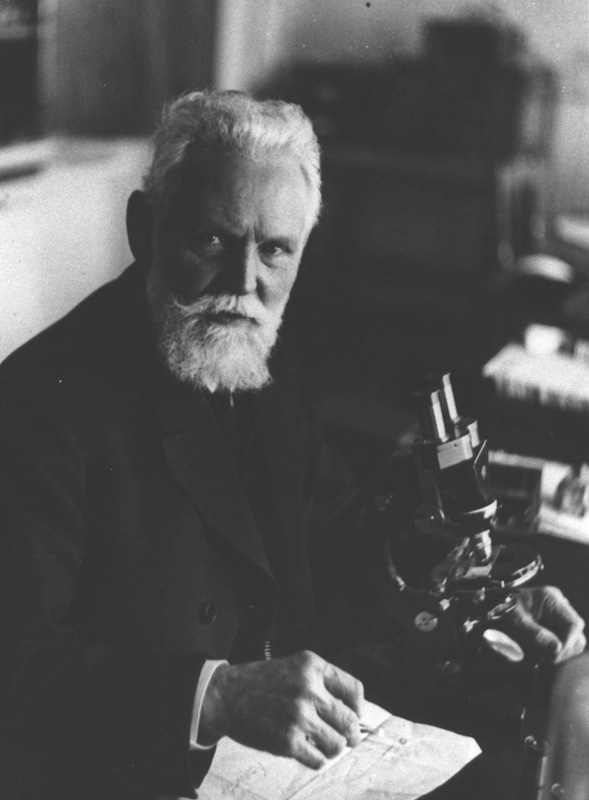In Breslau, wo Ploetz zunächst Nationalökonomie studierte, bildete er mit seinen Freunden Carl und Gerhart Hauptmann eine Lektüregruppe. In ihr entstand auch der Plan zur Gründung einer Kolonie auf sozialistischer Grundlage. Im Zuge der Sozialisten-Verfolgung floh Ploetz 1883 nach Zürich, wo er weiter Nationalökonomie studierte und die Bekanntschaft mit einigen Sozialist*innen und Sozialdemokrat*innen machte. Von Zürich aus ging Ploetz in die USA, um seine Kolonie-Pläne zu realisieren. Ein halbes Jahr später kehrte er zurück und nahm in Zürich ein Medizinstudium auf. Dort wurde er nachhaltig vom Psychiater Auguste Forel beeinflusst, der für Antialkoholismus und Frauenrechte, gegen Rassismus und Antisemitismus eintrat, zugleich aber auch als Eugeniker Kastrationen und Sterilisationen begrüßte.
1890 wurde Ploetz im Fach Medizin promoviert und heiratete Pauline Rüdin, die Schwester von Ernst Rüdin, der zum führenden Rassenhygieniker im nationalsozialistischen Deutschland aufsteigen sollte. Mit ihr zog Ploetz 1890 nach Springfield (USA), wo sie die nächsten vier Jahre in einer Art Kommune lebten, in der Ploetz seine sozialpolitischen Ideen zu verwirklichen versuchte. Er kam jedoch mehr und mehr von seinen früheren sozialistischen Idealen ab und zu der Ansicht, dass eine zukünftige Gesellschaft nach den Grundsätzen des Darwinismus gestaltet werden müsse.
In zweiter Ehe - die erste war 1898 geschieden worden - heiratete Ploetz die vermögende Anita Nordenholz und zog mit ihr nach Herrsching am Ammersee, wo er ein großes Gut erwarb. Ploetz gründete 1904 die Zeitschrift Archiv für Rassen- und Gesellschaftsbiologie, 1905 die ‚(Berliner) Gesellschaft für Rassenhygiene‘. Den Begriff ‚Rassenhygiene‘ hatte Ploetz im ersten Band seiner 1895 erschienenen Grundlinien einer Rassenhygiene eingeführt und erläutert. Unter ‚Rasse‘ verstand er eine durch Generationen lebende Gesamtheit von Menschen im Hinblick auf ihre körperlichen und geistigen Eigenschaften.
Dem Begriff der ‚Hygiene‘ im gewöhnlichen Sinne, der Individual-Hygiene, stellte er die Hygiene einer Gesamtheit von Menschen gegenüber. So könne man von der Hygiene einer Nation, einer Rasse im engeren Sinne oder von der gesamten menschlichen Rasse reden. Dabei sei die „arische Rasse“ die Kulturrasse par excellence, die zu fördern gleichbedeutend sei mit der Förderung der allgemeinen Menschheit. Die Grundforderung der Rassenhygiene, ursprünglich der deutsche Begriff für Eugenik, der „Wissenschaft vom guten Erbe“, lautete: Förderung von „Erbgesunden“ und Reduzierung von „Erbkranken“ in einer jeweiligen Bevölkerung.
Seine Veröffentlichungen und Verbandsgründungen etablierten die Rassenhygiene, wie er sie verstand, als wissenschaftliches Fach und Lehrgebiet an Universitäten, brachten sie breiteren Kreisen der Gesellschaft, insbesondere der Akademikerschaft, nahe und halfen, entsprechende Überlegungen und Vorschläge politisch durchzusetzen. Zusammen mit dem Psychiater Ernst Rüdin und dem Hygieniker Max von Gruber gründete Ploetz 1907 die ‚Münchner Gesellschaft für Rassenhygiene‘, aus der sich 1910 die ‚Deutsche Gesellschaft für Rassenhygiene‘ entwickelte. Mit diesen drei Rassenhygienikern sowie dem Professor für Rassenhygiene an der Universität, Fritz Lenz, war München neben Freiburg und Berlin schon früh ein Zentrum der Rassenhygiene-Bewegung.
Ploetz sah die Germanen aufgrund ihrer niedrigen Analphabetenrate als höherwertig an, wobei er der „nordischen Rasse“ ein besonderes Interesse entgegenbrachte. Daher widmete er sich ihrer angeblich notwendig gewordenen Rettung, indem er verschiedener Geheimbünde, wie etwa dem ‚Ring der Norda‘ (1907), gründete. Sie sollten in der ‚Gesellschaft für Rassenhygiene‘ Kernbestandteile für eine „nordisch-germanische Rassenhygiene“ sein und forderten von ihren Mitgliedern ein Bekenntnis zum „nordischen Gedanken“. Zu seinem 70. Geburtstag, am 22. August 1930, wurde Ploetz, wie es in der Urkunde hieß, „als herausragender Erforscher und eloquentester Verfechter der eugenischen Lehre“, zum Ehrendoktor der Naturwissenschaftlichen Fakultät der Universität München ernannt.
Die Machtergreifung der Nationalsozialisten begrüßte er nachdrücklich und wurde zusammen mit Fritz Lenz, Ernst Rüdin und Hans F. K. Günther Mitglied in dem 1933 durch Reichsinnenminister Frick eingesetzten ‚Sachverständigenbeirat für Bevölkerungs- und Rassenpolitik‘. Dieser Sachverständigenbeirat hatte die Aufgabe, alle einschlägigen Gesetzesentwürfe vor ihrer Beschlussfassung auf ihre bevölkerungs- und rassenpolitischen Auswirkungen und auf Fragen der Durchsetzbarkeit hin zu prüfen. 1936 wurde Ploetz von Hitler zum Professor ernannt. 1937 trat er in die NSDAP ein. Von den Nationalsozialisten ließ sich Ploetz als Vorkämpfer des sogenannten ‚wissenschaftlichen Rassegedankens‘ feiern.


